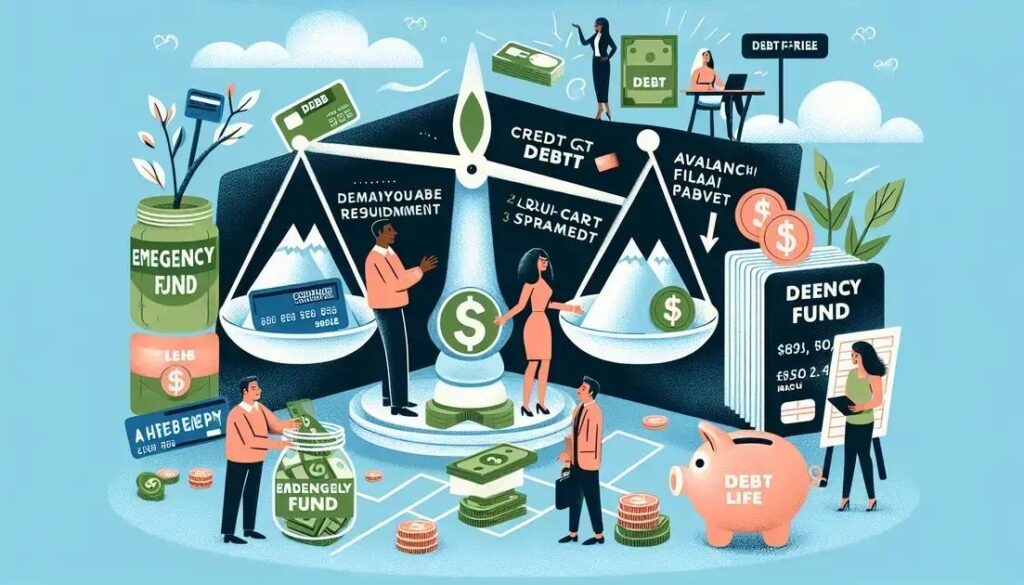Are you tired of living with the weight of credit card debt holding you back from achieving your financial goals? You’re not alone. In the United States, the average household credit card debt is over $15,000, with many individuals struggling to make payments.
But there is hope. By understanding the root causes of credit card debt and implementing effective debt management strategies, you can pay off your creditors and start fresh.
In this post, we’ll explore the causes and consequences of credit card debt, as well as provide tips and advice on how to negotiate with creditors, build an emergency fund, and achieve a debt-free life.
Understanding Credit Card Debt: Causes and Consequences
Credit card debt can be a significant burden for individuals and families, leading to financial stress, damaged credit scores, and even bankruptcy.
The causes of credit card debt are varied, including overspending, job loss, medical emergencies, and high-interest rates.
The consequences of credit card debt can be far-reaching, including reduced credit scores, increased debt-to-income ratios, and decreased financial flexibility.
To understand credit card debt, it’s essential to identify the root causes and develop strategies to manage and eliminate debt.
Debt Management Strategies: Snowball vs. Avalanche Methods
When it comes to managing credit card debt, two popular strategies are the snowball method and the avalanche method. The snowball method involves paying off credit cards with the smallest balances first, while the avalanche method involves paying off credit cards with the highest interest rates first.
Both methods have their advantages and disadvantages, and the best approach for an individual will depend on their unique financial situation and goals. For example, the snowball method can provide a sense of accomplishment and momentum as debts are quickly paid off, while the avalanche method can save money on interest charges.
Ultimately, the key to successful debt management is finding a strategy that works and sticking to it.
How to Negotiate with Creditors and Reduce Your Debt
Negotiating with creditors can be a daunting task, but it’s often a necessary step in reducing debt.
Before making a call, gather all relevant financial information, including credit card statements and income documentation.
Be honest and open with the creditor about your financial situation and explain why you’re struggling to make payments.
Creditors may be willing to work with you to reduce interest rates, waive fees, or temporarily suspend payments.
Additionally, consider debt settlement companies that can negotiate on your behalf.
Remember to stay organized, keep detailed records, and follow up with creditors regularly to ensure agreements are being upheld.
The Benefits of Credit Counseling and Debt Consolidation
Credit counseling and debt consolidation can be powerful tools in the fight against credit card debt.
Credit counseling services provide personalized advice and guidance from certified professionals who can help you create a budget, prioritize debt repayment, and communicate with creditors.
Debt consolidation, on the other hand, involves combining multiple debts into a single loan with a lower interest rate and a single monthly payment.
Both options can help you regain control of your finances, reduce stress, and achieve long-term financial stability.
By working with a credit counselor or debt consolidation service, you can get back on track and start building a brighter financial future.
Building an Emergency Fund to Avoid Future Debt
An emergency fund is a crucial component of a comprehensive financial plan, providing a safety net in case of unexpected expenses or financial setbacks.
Aim to save 3-6 months’ worth of living expenses in an easily accessible savings account.
Consider setting aside a portion of each paycheck in an automatic savings plan to make building your emergency fund a habit.
By having a cushion of cash set aside, you’ll be better equipped to handle financial surprises and avoid going into debt when unexpected expenses arise.
Long-Term Financial Planning: Achieving a Debt-Free Life
Long-term financial planning is crucial for achieving a debt-free life. Start by setting specific, achievable financial goals, such as paying off high-interest debt or building an emergency fund.
Create a comprehensive budget that accounts for all income and expenses, and prioritize needs over wants.
Consider working with a financial advisor to develop a customized plan tailored to your unique financial situation.
By prioritizing long-term financial planning, you’ll be better equipped to make informed decisions, avoid financial setbacks, and achieve a debt-free life.
Frequently Asked Questions about Credit Card Debt
What are the most common causes of credit card debt?
The most common causes of credit card debt include overspending, high-interest rates, and lack of budgeting. Additionally, major life events such as job loss, medical emergencies, and financial setbacks can also lead to credit card debt.
How can I negotiate with creditors to reduce my debt?
To negotiate with creditors, gather all relevant financial information, including credit card statements and income documentation. Be honest and open with the creditor about your financial situation and explain why you’re struggling to make payments. Creditors may be willing to work with you to reduce interest rates, waive fees, or temporarily suspend payments.
What are the benefits of credit counseling and debt consolidation?
Credit counseling provides personalized advice and guidance from certified professionals who can help you create a budget, prioritize debt repayment, and communicate with creditors. Debt consolidation involves combining multiple debts into a single loan with a lower interest rate and a single monthly payment, making it easier to manage your debt.
How can I build an emergency fund to avoid future debt?
To build an emergency fund, aim to save 3-6 months’ worth of living expenses in an easily accessible savings account. Consider setting aside a portion of each paycheck in an automatic savings plan to make building your emergency fund a habit.
What is long-term financial planning, and why is it important?
Long-term financial planning involves setting specific, achievable financial goals, creating a comprehensive budget, and prioritizing needs over wants. It’s essential for achieving a debt-free life and ensuring financial stability.



